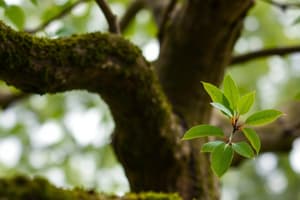Podcast
Questions and Answers
Which branch of science primarily focuses on living organisms?
Which branch of science primarily focuses on living organisms?
- Physical Sciences
- Life Sciences (correct)
- Social Sciences
- Formal Sciences
What is the first step of the scientific method?
What is the first step of the scientific method?
- Experimentation
- Question
- Observation (correct)
- Hypothesis
Which of the following best describes a scientific theory?
Which of the following best describes a scientific theory?
- An untestable guess about the world
- A well-substantiated explanation of an aspect of the natural world (correct)
- A statement that describes what happens under certain conditions
- A confirmed fact with no exceptions
What is the purpose of peer review in scientific research?
What is the purpose of peer review in scientific research?
What is the independent variable in an experiment?
What is the independent variable in an experiment?
Which of the following is NOT considered a formal science?
Which of the following is NOT considered a formal science?
Why is scientific literacy important?
Why is scientific literacy important?
What typically follows the analysis step in the scientific method?
What typically follows the analysis step in the scientific method?
Which of the following statements is true about scientific laws?
Which of the following statements is true about scientific laws?
Which branch of science would study human behavior and societies?
Which branch of science would study human behavior and societies?
Flashcards are hidden until you start studying
Study Notes
Definition of Science
- Systematic study of the natural world.
- Utilizes observation, experimentation, and analysis.
Branches of Science
-
Physical Sciences
- Focus on non-living systems.
- Includes physics, chemistry, astronomy, and geology.
-
Life Sciences
- Study of living organisms.
- Includes biology, ecology, genetics, and microbiology.
-
Formal Sciences
- Concerned with abstract concepts and logical reasoning.
- Includes mathematics, statistics, and computer science.
-
Social Sciences
- Study of human behavior and societies.
- Includes psychology, sociology, anthropology, and economics.
Scientific Method
-
Observation
- Gathering information through senses.
-
Question
- Formulating a question based on observations.
-
Hypothesis
- Proposing a testable explanation or prediction.
-
Experimentation
- Conducting experiments to test the hypothesis.
-
Analysis
- Interpreting data collected during experiments.
-
Conclusion
- Drawing conclusions to support or refute the hypothesis.
-
Replication
- Repeating experiments to validate findings.
Key Concepts
-
Theory vs. Law
- Theory: A well-substantiated explanation of an aspect of the natural world.
- Law: A statement based on repeated experimental observations that describe an aspect of the world.
-
Variables
- Independent Variable: The factor manipulated in an experiment.
- Dependent Variable: The factor measured in response to changes in the independent variable.
-
Peer Review
- The process of evaluating scientific work by other experts in the field before publication.
Importance of Science
- Advances technology and medicine.
- Enhances understanding of the natural world.
- Informs policy and decision-making.
- Encourages critical thinking and problem-solving.
Scientific Literacy
- The ability to understand and engage with scientific concepts and processes.
- Essential for informed citizenship and personal decision-making.
Definition of Science
- Systematic study of the natural world through observation, experimentation, and analysis.
Branches of Science
- Physical Sciences: Explore non-living systems; includes physics, chemistry, astronomy, and geology.
- Life Sciences: Focus on living organisms; encompasses biology, ecology, genetics, and microbiology.
- Formal Sciences: Involves abstract concepts and logical reasoning; includes mathematics, statistics, and computer science.
- Social Sciences: Examine human behavior and societal structures; involves psychology, sociology, anthropology, and economics.
Scientific Method
- Observation: Collecting information using senses.
- Question: Developing a question based on gathered observations.
- Hypothesis: Formulating a testable explanation or prediction.
- Experimentation: Performing experiments to evaluate the hypothesis.
- Analysis: Interpreting data acquired during experiments.
- Conclusion: Drawing conclusions to either support or refute the hypothesis.
- Replication: Repeating experiments for reliability of findings.
Key Concepts
- Theory vs. Law:
- Theory: A well-supported explanation of natural phenomena.
- Law: Empirical statements based on repeated observations describing aspects of the natural world.
- Variables:
- Independent Variable: The variable manipulated in a study.
- Dependent Variable: The variable measured in response to the independent variable.
- Peer Review: A quality control process where scientific work is evaluated by experts before publication.
Importance of Science
- Propels advancements in technology and medicine.
- Deepens comprehension of the natural world.
- Guides policy and decision-making processes.
- Fosters critical thinking and problem-solving abilities.
Scientific Literacy
- The capability to understand and interact with scientific concepts and processes.
- Crucial for informed decision-making and responsible citizenship.
Studying That Suits You
Use AI to generate personalized quizzes and flashcards to suit your learning preferences.




